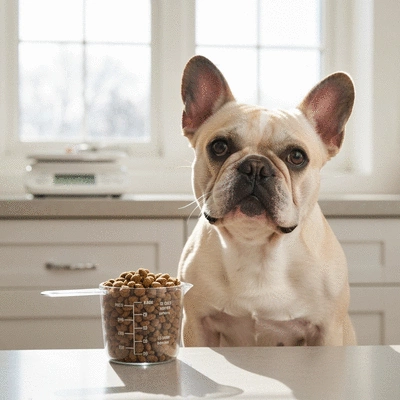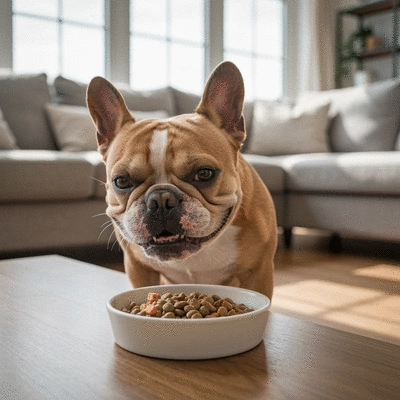Managing Your French Bulldog's Calories

Understanding your French Bulldog's unique needs is crucial for their health and happiness. With their charming personalities and distinct physiques, it's essential to tailor their care, particularly regarding caloric intake. Here are the vital lessons you'll gain from this guide.
What You Will Learn
- Daily caloric needs for French Bulldogs typically range from 25 to 30 calories per pound, varying by age and activity level.
- Puppies require a higher caloric intake (30 to 35 calories per pound) due to their growth, while seniors may need fewer calories (20 to 25 calories per pound).
- French Bulldogs have unique traits, such as being brachycephalic, which can affect their exercise ability and caloric needs.
- Obesity poses significant health risks for French Bulldogs, including joint problems, respiratory issues, and heart disease.
- Monitoring your French Bulldog’s weight and adjusting their diet based on their life stage is crucial for preventing obesity and maintaining overall health.
Understanding Caloric Needs by French Bulldog Life Stage
Each life stage of a French Bulldog has unique caloric requirements to ensure optimal health and well-being. This visual outlines the typical daily calorie ranges per pound of body weight for puppies, adults, and seniors, highlighting how needs change over time. For more in-depth information on nutrition, you can explore French Bulldog Diet Tips for Aussies.
Puppy Caloric Needs
Require higher intake for rapid growth and development.
Adult Caloric Needs
Balanced diet to maintain weight and support energy levels.
Senior Caloric Needs
Reduced activity typically means fewer calories are needed.
Factors Influencing Needs
- • Activity Level
- • Metabolic Rate
- • Health Conditions
- • Breed-Specific Traits
Understanding Caloric Needs for Your French Bulldog
As a French Bulldog owner, one of the most important aspects of keeping your furry friend healthy is understanding their caloric needs. Just like us, dogs require a certain number of calories each day to maintain their weight, stay active, and lead a happy life. But how do we determine those needs? Let’s dive into the essential factors that influence your Frenchie's daily caloric intake!
Every dog is different, and their caloric requirements can vary based on numerous factors. Factors include their age, weight, activity level, and even their breed-specific traits. With my experience as a French Bulldog enthusiast, I’m here to guide you through understanding what your Frenchie requires to thrive!

What Are Daily Calorie Needs for Dogs?
Daily calorie needs for dogs can generally be calculated using a simple formula that takes into account their weight and activity level. For most dogs, including our lovable French Bulldogs, the typical range is about 25 to 30 calories per pound of body weight. However, this can vary based on their individual needs.
- Puppies generally need more calories due to rapid growth.
- Active adult dogs require a higher calorie intake to support their energy levels.
- Seniors may need fewer calories, as their activity levels tend to decrease.
It's crucial to adjust these numbers as needed, depending on your French Bulldog's life stage and lifestyle. Keeping track of their weight and adjusting their food accordingly can help maintain their health.
How French Bulldog Characteristics Affect Caloric Intake
French Bulldogs are a unique breed with specific physical traits that can impact their caloric needs. Their compact size and muscular build mean they may have different energy requirements compared to larger breeds. Additionally, their brachycephalic (flat-faced) nature can lead to breathing difficulties, especially during exercise, which is an important consideration when determining how much they should eat. Understanding these breed-specific challenges is key to their well-being, and you can learn more about French Bulldog Health Issues Explained.
Here are some key characteristics to keep in mind when assessing your Frenchie's caloric needs:
- Short muzzle can limit their ability to exercise, potentially lowering their caloric needs.
- Prone to certain health issues, which can influence their energy levels.
- Need for a balanced diet that supports their specific health needs.
By understanding these special characteristics, you can make informed decisions about your French Bulldog's diet and overall well-being.
Life Stage Considerations: Puppies, Adults, and Seniors
When it comes to feeding your French Bulldog, their life stage plays a vital role in determining how much they should eat. Puppies, adults, and seniors all have different nutritional needs that must be met to ensure a healthy life.
- Puppies: Require higher caloric intake for growth—approximately 30 to 35 calories per pound.
- Adults: Should maintain a balanced diet, typically needing 25 to 30 calories per pound.
- Seniors: May need fewer calories, around 20 to 25 calories per pound, due to decreased activity levels.
As your French Bulldog transitions through these stages, it’s essential to adjust their diet accordingly. Consulting with your vet can provide tailored guidance to ensure your dog receives the appropriate nutrition at each life stage.

Understanding Your French Bulldog’s Metabolic Rate and Energy Needs
Every dog has a unique metabolic rate, which can greatly influence their caloric needs. Factors like age, breed, and overall health all contribute to how efficiently a French Bulldog burns calories. To understand your Frenchie's specific energy needs, consider the following:
- Regularly monitor their weight and adjust their food intake as necessary.
- Factor in daily exercise to calculate total caloric expenditure.
- Watch for any health issues that may affect their metabolism.
By paying attention to these elements, you can better manage your French Bulldog's weight and overall health. Remember, a happy dog means a happy owner, and keeping track of their caloric intake is a crucial step in that journey!
Pro Tip
To ensure your French Bulldog maintains a healthy weight, consider implementing a consistent feeding schedule. Avoid free-feeding, as it can lead to overeating. Instead, feed your dog at the same times each day, and measure their food portions based on their caloric needs. This will help you monitor their intake effectively and keep obesity at bay!
Identifying Risks of Obesity in French Bulldogs
As a dedicated French Bulldog enthusiast, I can't stress enough how vital it is to recognize the risks associated with obesity in our beloved companions. French Bulldogs, with their charming personalities and distinct physiques, can easily fall prey to weight gain if we're not vigilant. Understanding these risks is the first step in ensuring that our dogs lead healthy, active lives!
Obesity can lead to a host of health complications that can significantly impact your Frenchie’s quality of life. Let's dive into what these complications are and how we can prevent them.
Health Complications Linked to Excess Weight
- Joint Problems: Extra weight can put strain on their joints, leading to conditions like arthritis.
- Respiratory Issues: French Bulldogs are brachycephalic, meaning they already have breathing challenges. Being overweight can exacerbate these problems!
- Heart Disease: Increased weight can strain the heart and lead to serious cardiovascular issues.
- Diabetes: Obesity can increase the risk of diabetes, making it crucial to monitor their weight closely.
Each of these health issues not only affects our dogs’ physical capabilities but also their happiness and energy levels. As a responsible owner, it’s essential to keep an eye out for these complications and take action to prevent them. Regular vet check-ups are also crucial, as detailed in Vet Tips for Your French Bulldog.
Behavioral Indicators of Overweight French Bulldogs
Aside from the physical health risks, certain behaviors can signal that your French Bulldog might be overweight. Have you noticed any of these signs in your furry friend?
- Reduced Activity: If your dog is less willing to play or go for walks, it might be time to reassess their weight.
- Difficulty Breathing: Watch for panting or labored breathing during normal activities.
- Increased Begging: Overweight dogs may beg more frequently, even after meals.
These behavioral indicators are crucial for understanding your dog’s condition. They can help you make informed decisions about diet and exercise, ensuring your Frenchie remains playful and energetic!
Understanding Canine Obesity: Causes and Prevention Strategies
Canine obesity is often a result of a combination of factors, including diet, activity level, and even genetics. Knowing these causes will empower you to take proactive steps for your French Bulldog's health.
- Poor Diet Choices: Feeding low-quality food or overindulging in treats can lead to weight gain.
- Inactivity: A sedentary lifestyle is detrimental. Regular exercise is a must!
- Genetics: Some dogs may be predisposed to weight gain, so being mindful is vital.
Preventing obesity starts with making informed choices about your dog’s nutrition and activity levels. I’ve found that having a balanced feeding schedule and incorporating regular exercise can work wonders in maintaining a healthy weight!
Recap of Key Points
Here is a quick recap of the important points discussed in the article:
- Daily caloric needs for French Bulldogs range from 20 to 35 calories per pound, depending on their life stage and activity level.
- Factors such as age, weight, and breed-specific traits affect your Frenchie's caloric intake.
- Puppies require more calories for growth, while seniors may need fewer due to reduced activity.
- Regularly monitor weight and adjust food intake to prevent obesity-related health issues.
- Recognize behavioral indicators of obesity, such as reduced activity and difficulty breathing.
Frequently Asked Questions About French Bulldog Caloric Needs
Q: How many calories does a French Bulldog need daily?
A: The daily caloric needs for French Bulldogs generally range from 25 to 30 calories per pound of body weight for adults. However, this varies based on age, activity level, and health conditions.
Q: Do French Bulldog puppies need more calories than adult French Bulldogs?
A: Yes, French Bulldog puppies require a higher caloric intake, typically around 30 to 35 calories per pound, to support their rapid growth and development.
Q: How do French Bulldog characteristics affect their caloric intake?
A: French Bulldogs' brachycephalic (flat-faced) nature can limit their ability to exercise vigorously, potentially leading to lower caloric needs compared to more active breeds. Their compact size and muscular build also influence their energy requirements.
Q: What are the risks of obesity in French Bulldogs?
A: Obesity in French Bulldogs can lead to serious health complications, including joint problems (like arthritis), exacerbated respiratory issues due to their brachycephalic nature, heart disease, and an increased risk of diabetes.
Q: How can I tell if my French Bulldog is overweight?
A: Behavioral indicators of an overweight French Bulldog include reduced activity, less willingness to play or walk, difficulty breathing (panting or labored breathing during normal activities), and increased begging for food.
Q: What's the best way to prevent obesity in my French Bulldog?
A: Preventing obesity involves a balanced diet with appropriate portion sizes, regular exercise tailored to their abilities, and monitoring their weight. Avoid free-feeding, and consult with your vet for personalized dietary advice.









